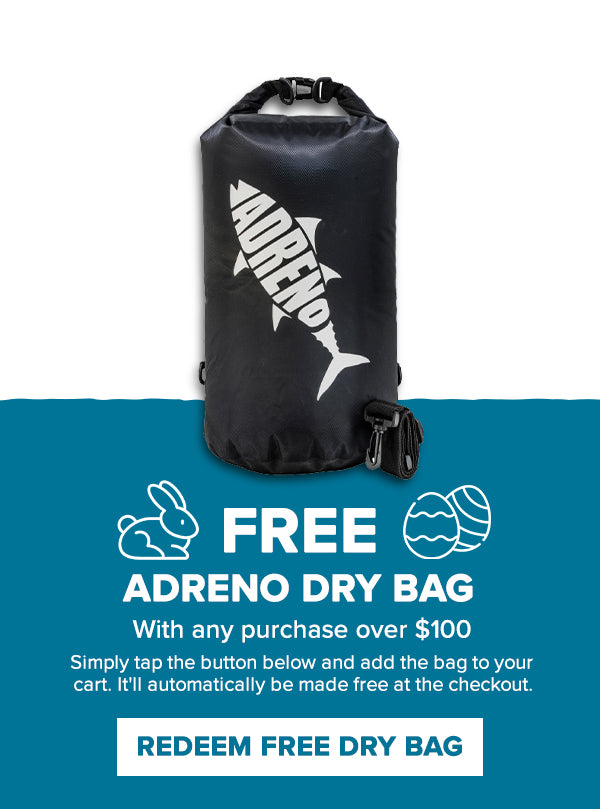Un-zip the secrets of Wetsuit Entry Systems
August 18, 2021 7 min read

A zip isn't just the way you get into your wetsuit. It has a bearing on all facets of perfomance.
Clearly, we are concerned by zippers.
It’s not simply a case of most expensive is best but more so what sort of entry you’re able to get in and out of comfortably, in some cases, Xcel being the case in point, their cheaper suits offer arguably the best chest-entry on the market. A zipper is the only part on your wetsuit that doesn’t stretch and is generally the biggest source of cold-water flushes through the suit, this is because it’s impossible to seal a zipping closure. Generally, within contemporary wetsuit design, the "best" wetsuit is one that utilises a Taped and/or GBS seam [Glued & Blind-stitched] and a chest zip, or zipperless shoulder entry. In saying that, your best is not my best and this idea of "the best suit" is purely an expression of personal experience.
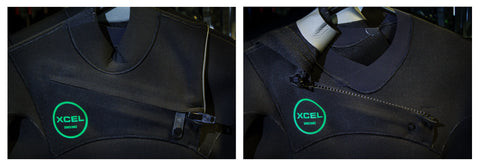
We've come a long way since footy Guernseys.
In recent years there have been many advances in the way we get into our suit, most advances being in relation to the position of the entry. Maybe 10-12 years ago the shoulder entry was unleashed upon the surfing market by Rip curl and the game changed forever. The chest entry, from shoulder to shoulder, was not a result of direct consideration of the zipper but a result of reaching a glass ceiling in stretch of the neoprene itself. You can’t just keep on making the neoprene stretchier because it gets to a point where the suit won’t seal around your body, nor will it retain its shape.
Stretch in Neoprene is a result of nitrogen bubbles within the elastomer, or the rubbery part, so by putting in more nitrogen you’re increasing stretch but reducing the volume of rubberin the suit which can have a negative affect on durability. The presence of air bubbles inside the rubber is warmer than a solid sheet of rubber - source. In the surfing world, increasing nitrogen content/decreasing neoprene volume has few negative affects, as we mentioned, basically just durability, but a diving suit is a different kettle of fish. In the diving world your biggest enemy is always buoyancy and the bubbles generate substantially more positively buoyant than the material itself - that results in scuba suits being more dense, which is why they can feel stiff. With these notions in mind, it’s easy to see why developing a better zip system was the only way to increase the over all comfort and stretch of a suit.
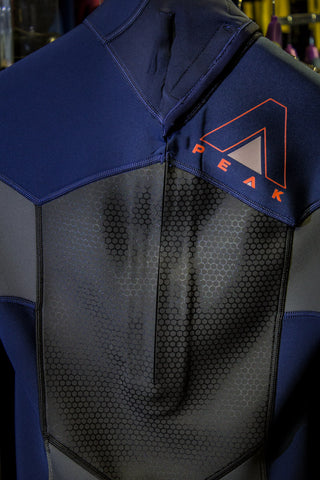
Fundamental flaws of the Back Zip
Before we get stuck into this idea, it's important to remember that we're not all built the same, nor is our tolerance to cold, nor is our expectations from a wetsuit. The idea that a back-zip does not provide the same paddle stretch is set in the surfing industry but the recent emergence of a new wave of back zips is changing that by basically attaching the zip mechanism to the outside of the suit, not a part of the suit itself. It essentially acts as fastener, not a closure system. Let us think about the back entrance: it runs along the length of the spine which means that the entire back panel can’t grow because of this zipper. The panels alongside will stretch but being anchored to the zipper means failures occur under extreme stress because the zip, being the toughest part, will tear away from its setting in the suit. When you’re surfing your generally bending over, the motion of standing-up requires immense curvature of the back, as you tuck your legs in under your torso, which is directly limited by the back-zip, yes that’s right, the one action that requires the most amount of stretch is ruined by the zip.
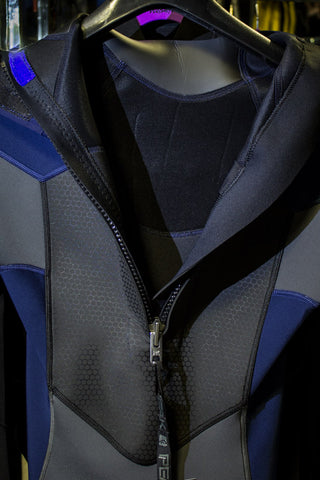
Aside from back-based flexibility back-zips are positioned in the most vulnerable zone for water pressure- picture your duck-dive, with a huge wave unloading above you, all of that pressure simply pushes the water in through the zip, completely negating the function of a wetsuit [to seal and insulate from cold water]. For applications such as scuba and free diving, the back-zip performs well, the only concern for scuba being that your gear presses against the back, pushing the zip into the spine. As for paddle sports like SUP or kayaking, the back zip works fine in keeping the wearer warm but in the case of kayaking, you don’t want the zip digging into your spine when you lean back in your seat.
How can I stop water entering my wetsuit through the zip?
There is a fix to the water penetration problem, a feature generally referred to as the Backwing or Bat-Wing, or zip gusset but different companies use different trademarks to brand the system. Luckily, the principle stays the same- by stitching a panel on the inside of the zip, anchored along the base of the zip up to the shoulders. This panel acts as a barrier that stops the water that has moved through the zip from entering the body compartment of the suit, the water then runs out of pinholes at the base of the zip or out of the zip itself. The Batwing is very effective in increasing warmth in the suit but has no bearing on the stretch, in fact, it’s more likely to reduce the overall freedom of the zip.
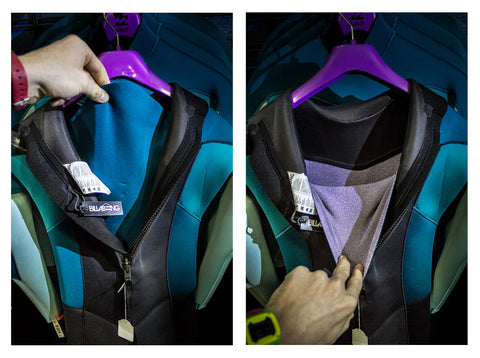
Back zips make paddling more strenuous.
The idea that back-entry limit paddling flexibility lies in the fact that stretch is a percentage based unit, for eg. if you have 1 meter of neoprene with a stretch factor of 125% that 1 meter can stretch out to 2.25m without failure/deformation. Now let us consider how you paddle or swim freestyle, and how this ‘reach’ puts strain under the arm and along the back panel. Therefore having a zip which breaks up the back panel means you’re only drawing stretch from half of the back panel, if the back panel is free of a zip you can draw stretch from as far down as your lumbar etc, resulting in greater growth potential in the back and shoulder panels.
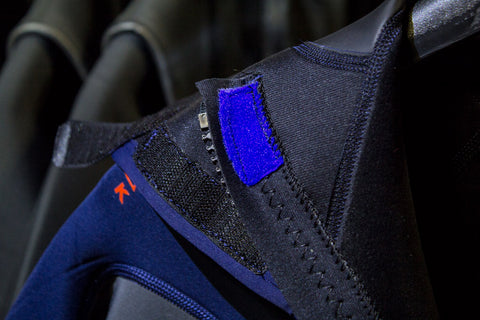
This little blue ditty is placed there to put hold your velcro when trying on the suit and will prevent damaging the interior lining of your wetty.
The Chest Zip revolution: Once you go front, you’ll never go back.
Sometimes, not always, but sometimes a design emerges that changes the game for all the right reasons, the chest-zip is one of those designs. Placing a zipper between the shoulders proved to completely fix all of the problems associated with the back zip. All of a sudden there was no inhibition of back flex [think about the motions of standing up and how much arch you create along the length your spine], more paddle freedom and best of all no cold-water flushes every time you wiped out or duck dived. Although I struggle to find a negative to the chest zip I can sympathize with people's concern about trying them on but once you learn the backzip wiggle you’ll laugh at your now forgotten fears.
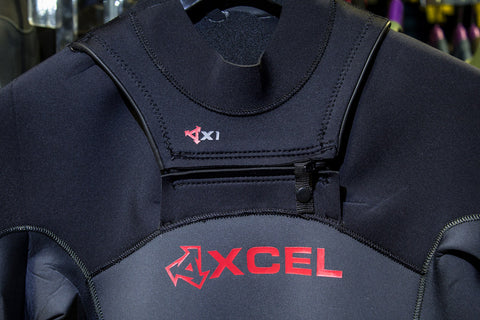
Bib-Style Chest zip.
Anecdotally, well at least for me, a buddy of mine who skateboards professionally came in to get a springsuit and I led him into a short-zip chesty. Unbeknownst to me, after approximately two dozen dislocations, his shoulders pop out with a sneeze and here I found him, half way into the suit with two dislocated shoulders. Lucky for him, simply bending over and breathing out is all he needs to do to reset the shoulder… Moral of the story, if you’re not very flexible or have dodgy shoulders you should probably go for a back zip.
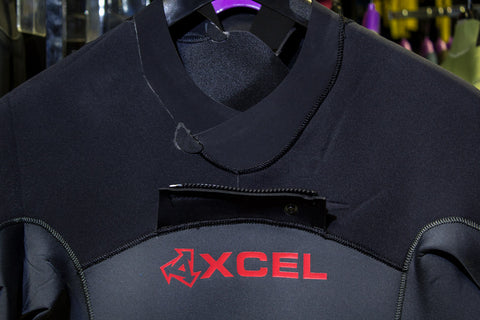
What about price?
For now the chest closure is reserved for expensive wetsuits but in my opinion, these wetsuit companies shouldn’t hold it back from the market simply because they want to force people into a better suit. Sure it’s in a different place but the closure is the same, in most cases, it’s shorter too and I dare say requires much less reinforcement because of the human body’s ability to expand the region on your chest between your shoulders. Maybe I’m being cynical but I just want people to be warmer and comfier! There’s only one kind of chest zip: a sick one because they’re all sick… I love good design and the chest zip is simply that.
Zipperless Surfing Wetsuits?
Have you ever put sticky tape on a balloon? I haven’t but I figure the analogy works... If you put a material that doesn’t stretch onto a stretchy membrane the stretch is limited to that of the non-stretch material. Therefore if you put a zipper on a wetsuit, it limits the stretch of the neoprene... Therefore a no-zip wetsuit is the stretchiest wetsuit design possible. Correct me if I’m wrong, but the current iteration of zipperless was spawned from the R&D team at Rip Curl circa 2005. Nowadays most surf companies offer a no-zip wetsuit, such as this Peak wetsuit pictured.
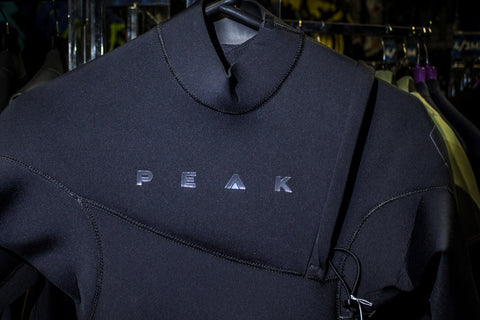
The no-zip movement will probably stick around because they give you the no-flush benefits of a chest zip without limiting stretch in both paddling and general movement. This makes them ideal for surfing but also the most comfortable suit for paddle sports such as Stand up Paddle Boarding, Kayaking and Canoeing. A SUP wetsuit only really requires decent stretch in the panels relevant to the paddle stroke.
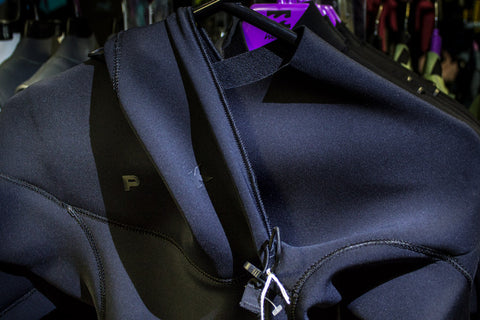
Offset Zipper
The offset zip is probably the easiest to explain in the sense that it’s a standard backzip that runs slightly diagonally from shoulder to hip. They say it makes for better paddling flexibility but I just can’t seem to justify this notion. It’s still a back zip, it’s still limited growth potential by dissecting the back panel. In my 15 years of fitting and selling wetsuits, the only benefit I can perceive is in relation to accessibility. If you aren't very flexible and you find it difficult to get your hands on your zipper tether, at the bottom or top of the enclosure, you'll find the offset zip is much easier to reach, zip up and most importantly- get off!!
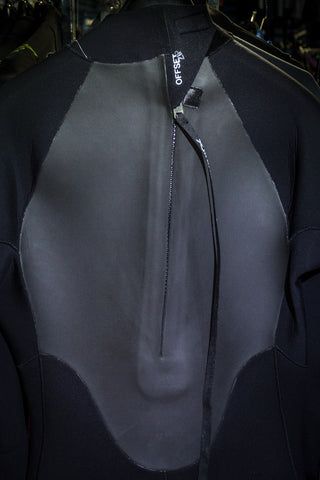
Be sure to check out the range over on our site: www.freediving.com.au and if you've got any questions don't be afraid to give your local store a call or hit up the live feed on our website! All photos shot in our Brisbane Store.


